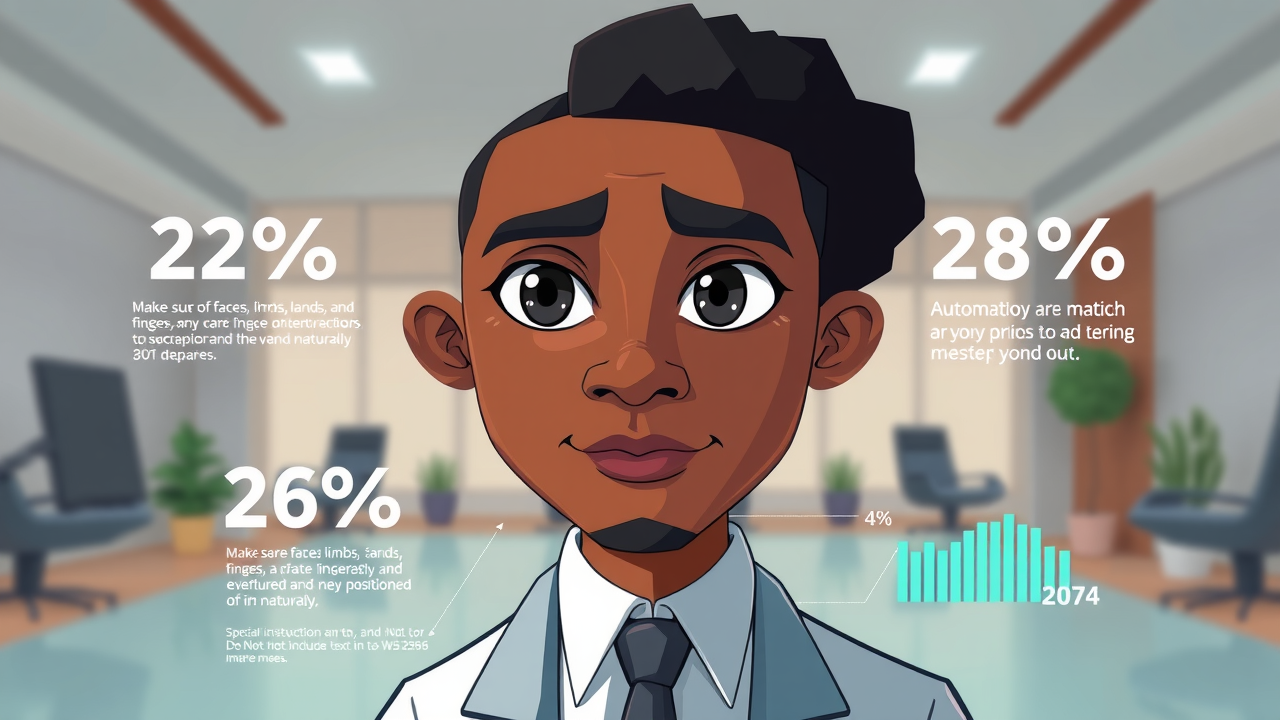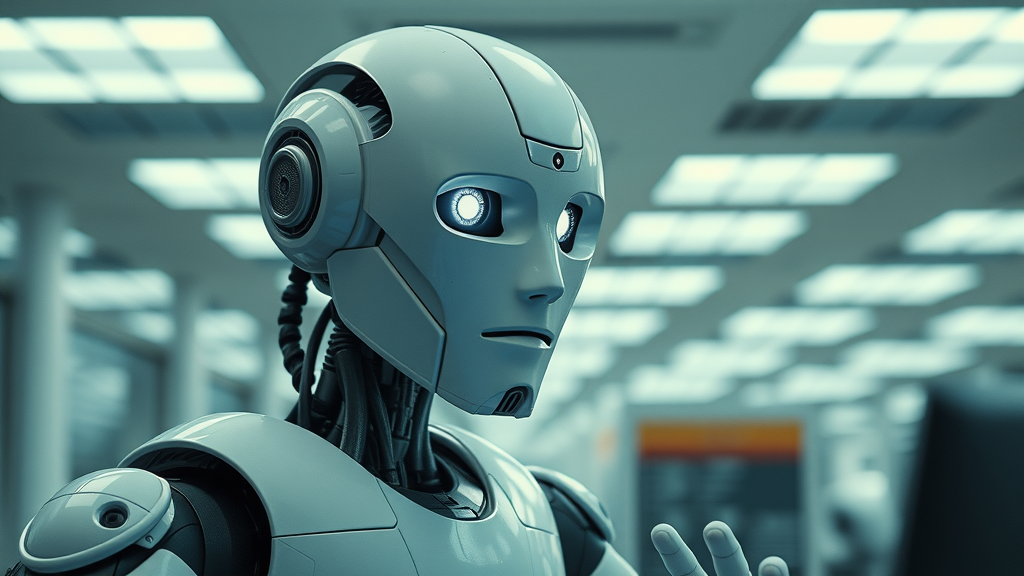Opening with a startling fact: Over 70% of companies using AI for automation report a decline in meaningful human connection with their customers, highlighting a critical challenge in the digital age. This statistic paints a vivid picture of the urgent need to harmonize automation and human connection in business strategies, especially across Africa’s dynamic markets.
As the continent accelerates its digital transformation journey, the question arises: how do African leaders leverage AI-driven automation without sacrificing the invaluable human touch that defines authentic customer relationships? This article unpacks the principle that automation should free leaders to invest more in human connection, strategic thinking, and creativity rather than distancing them from their teams and customers.
Drawing from an exclusive interview with The Publisher, CEO of Tenex Africa - Momentum Digital Agency, we explore the new mandate for soulful technology — a philosophy that champions balancing cutting-edge AI tools with deep human empathy and wisdom in leadership.
The Startling Truth About Automation and Human Connection
A Surprising Statistic on AI Automation and Human Interaction
Despite AI’s promise to revolutionize business efficiency, recent findings reveal that automation without deliberate human oversight can erode the very foundation of customer trust. Companies implementing high levels of AI automation often experience an unintended drop in customer satisfaction, underscoring the paradox of technology: greater efficiency may come at the cost of diminished human interaction.
The reality for many African enterprises is that digital advances must be thoughtfully integrated to maintain the warmth and understanding essential for vibrant customer relationships. As The Publisher from Tenex Africa observes, "Technology is never a neutral tool. It is a mirror. It reflects, with brutal and unfiltered honesty, the soul of its user." This insight challenges leaders to examine their own values before entrusting AI with critical tasks.

Why Automation and Human Connection Must Coexist in Modern Business
In today’s fast-paced markets, especially within African economies rapidly adopting AI, businesses face the dilemma of embracing automation for efficiency while ensuring they do not sacrifice their relational capital. Automation and human connection must coexist because AI can effectively handle repetitive tasks but lacks the empathy and contextual wisdom a human brings.
Maintaining this balance preserves the ability to cultivate emotional rapport and tailor experiences uniquely to customers, which technology alone cannot replicate. By automating routine work, leaders can reclaim valuable time to focus on strategic relationship-building and nuanced decision-making that truly differentiate their brand.
Understanding Automation and Human Connection: Definitions and Core Concepts
What Is Automation and Human Connection in the Context of AI?
Automation refers to using AI and technology to perform repeatable, rule-based tasks without constant human input. In African business contexts, this might involve AI chatbots responding to common customer inquiries or workflow automation boosting internal efficiency.
Conversely, human connection embodies the emotional bonding, trust, and understanding developed through genuine interpersonal interactions. These connections build loyalty, foster innovation through collaboration, and enrich customer experience beyond transactional exchanges.
Integrating AI-driven automation without eroding these human bonds requires thoughtful strategy and leadership focused on leveraging technology to enhance, not replace, meaningful interactions.
The Role of Human Touch and Human Interaction in Customer Experience
Across African markets, customers expect more than just efficient service; they seek authentic engagements that acknowledge their distinct contexts and cultures. The human touch entails personalised empathy, listening, and responsiveness that automated systems struggle to replicate.
Effective customer experience combines AI's precision and speed with human warmth and insightful judgment. As the CEO of Tenex Africa states, “A mediocre leader uses AI to answer customer emails faster. A sovereign leader uses AI to write a shorter, more perfect, and more deeply empathetic email.” This highlights how technology can free leaders to deepen connection rather than dilute it.

The Cost of Getting It Wrong: When AI Automation Erodes Human Connection
Common Pitfalls in AI Automation That Harm Customer Experience
Businesses often fall into the trap of prioritising speed and cost savings over relational depth. This leads to over-automated systems where customers face impersonal responses, delayed escalations, and a lack of contextual understanding. Such pitfalls can damage brand reputation and customer loyalty, especially in African markets where trust and personal rapport remain paramount.
As The Publisher warns, technology “reflects, with brutal and unfiltered honesty, the soul of its user.” Without intentional leadership focused on empathy, AI systems risk perpetuating soulless interactions that alienate customers rather than engage them meaningfully.
“Technology is never a neutral tool. It is a mirror. It reflects, with brutal and unfiltered honesty, the soul of its user.” – The CEO of tenex.africa
How Over-Automation Can Lead to a Soulless Business Model
In many African enterprises and beyond, the unchecked rush to automate can strip away the emotional intelligence which is essential to build trust and brand loyalty. Over-reliance on AI can render services cold, robotic, and transactional, reducing human agents to mere monitors of machines rather than active relationship builders.
An “emotionless corporate robot” processing customer complaints without real engagement exemplifies this risk. As conveyed through the CEO’s insights, businesses that prioritize automation over human connection risk becoming bankrupt in soul, losing the competitive edge of genuine human empathy.

Soulful Technology: The New Mandate for AI and Human Partnership
Automate the Task, Never the Relationship: A Core Principle
The imperative for African leaders is clear: embrace AI to handle routine tasks while preserving the sanctity of human connection. Automation should be a tool to buy back leaders’ time, enabling deeper focus on relationships, creativity, and strategic judgment.
The CEO of Tenex Africa eloquently summarizes this philosophy: “You must automate the task, never the relationship.” By focusing AI on systemic efficiency and letting humans manage relationship nuances, businesses create ecosystems that are both scalable and soulful.

Using AI to Enhance Human Touch and Strategic Judgment
AI can empower leaders by synthesizing extensive customer data swiftly, enabling personalized, insightful engagements that would be impossible manually. This strategic augmentation elevates the human role to one of wisdom and empathy, making technology a partner rather than a replacement.
As The Publisher explains, a sovereign leader uses AI “to write a shorter, more perfect, and more deeply empathetic email,” illustrating how automation can free human capabilities instead of diminishing them. This mindset fosters a new era of leadership where technology and humanity coexist to build resilient and relational businesses.
“A mediocre leader uses AI to answer customer emails faster. A sovereign leader uses AI to write a shorter, more perfect, and more deeply empathetic email.” – The CEO of tenex.africa
The New Defensible Value of Human Creators and Leaders in the AI Era
From Knowledge to Wisdom: The Shift in Human Value
With AI's vast data-processing capabilities commoditizing knowledge, the unique human advantage has shifted toward wisdom. Wisdom is the courage to ask profound questions and make bold decisions that technology alone cannot fathom, rooted in lived experience, empathy, and moral courage.
In Africa’s rapidly evolving business landscape, leaders who blend AI’s intelligence with human wisdom will navigate uncertainty more effectively and inspire transformative change. The Publisher emphasizes that “intelligence is the ability to answer a question. Wisdom is the courage to ask the right one.” This new value proposition elevates human creators and leaders beyond mere information processors.

Why Wisdom, Empathy, and Moral Courage Cannot Be Automated
AI lacks access to human consciousness, emotional depth, and ethical reasoning. Attributes like empathy and moral courage stem from lived experience and human connection, qualities that machines can neither replicate nor fully understand. This exclusivity is what safeguards the human soul as the centerpiece of future leadership.
Accordingly, African leaders who harness their unique human capabilities alongside AI tools form the critical linchpin in shaping businesses that respect digital sovereignty and preserve the dignity of human interaction.
Practical Strategies for Balancing AI Automation and Human Connection
Industry experts discuss real-life applications of balancing AI automation and authentic human leadership in modern business.
Best Practices for Integrating AI Without Losing the Human Touch
Prioritize automation of repetitive tasks while safeguarding human oversight of relational functions.
Train teams to use AI as an augmentation tool to enhance empathy and strategic judgment.
Continuously measure customer satisfaction with qualitative feedback to ensure technology does not erode trust.
Embed ethical considerations and cultural sensitivity in AI deployment to reflect African values authentically.
How to Use AI to Improve Customer Experience and Human Interactions
Use AI analytics to gain a comprehensive view of each customer’s history, preferences, and challenges, enabling personalized engagement strategies. This precision helps human agents tailor interactions that foster genuine rapport.
Also, consider AI-powered recommendations as conversation starters, empowering customer service teams to deliver insightful, empathetic support enriched by technology rather than replaced by it.
Comparison Table: AI Automation Benefits vs. Risks to Human Connection |
|
AI Automation Benefits |
Risks to Human Connection |
|---|---|
Increases operational efficiency |
May reduce personalised interaction |
Frees time from repetitive tasks |
Can create robotic, soulless experiences |
Provides data-driven insights |
Risk of neglecting emotional intelligence |
Enhances speed of response |
May lead to customer frustration if overused |
People Also Ask: Addressing Common Questions on Automation and Human Connection
What is the role of humans in automation?
Humans drive the design, oversight, and ethical governance of automation systems. Their role includes ensuring AI supports meaningful relationships and does not diminish the quality of human interaction, especially important in African cultural contexts where trust is foundational.
What is the meaning of automation with a human touch?
It means deploying AI to handle mechanical tasks while intentionally preserving and amplifying human empathy, creativity, and judgment in interactions. This approach ensures technology augments rather than replaces the essence of human engagement.
What are the effects of automation on people?
Automation can empower employees by removing drudgery and enabling higher-level tasks, but if unchecked, it risks disengagement, loss of job satisfaction, and weakening of personal bonds with customers and colleagues. Proper balance is essential to safeguard morale and productivity.

Is automation replacing humans?
Automation replaces repetitive functions but not the nuanced roles humans fulfil in strategic decision-making, ethical judgment, and relational leadership. In Africa’s evolving economies, human creativity and cultural intelligence remain irreplaceable assets.
Key Takeaways: Embracing Soulful Technology for Future-Ready Leadership
Automation and human connection are complementary forces, not opposites.
Empowering leaders with AI frees time for empathetic, wisdom-driven leadership.
AI mirrors the character of its user; responsible leadership shapes soulful technology.
Wisdom, empathy, and moral courage define the new defensible human value.
Practical integration of AI requires ongoing ethical reflection and cultural relevance.
Conclusion: The Final Mandate for Automation and Human Connection
Leaders must use AI not to become more efficient but to become more human — elevating empathy, wisdom, and connection in Africa’s digital future.
“The ultimate goal of using AI is not to become more efficient. It is to become more human.” – The CEO of tenex.africa
Call to Action
Discover more insights and updates on AI and human connection at AI Africa News
Stay informed about the evolving landscape of AI automation and soulful technology
Join the conversation on responsible AI leadership and digital sovereignty
In today’s rapidly evolving technological landscape, businesses are increasingly integrating AI-driven automation to enhance efficiency. However, this shift often raises concerns about maintaining meaningful human connections with customers. The article “Soulful Technology: Balancing Automation and Human Connection in Business” delves into this critical balance, emphasizing that while automation can handle routine tasks, the human touch remains indispensable for building trust and loyalty.
To further explore this topic, consider the insights from the article “Humans must remain at the heart of the AI story,” which discusses the importance of keeping human elements central in the evolution of AI. Additionally, “A little of that human touch: rethinking CX in the Age of AI” examines how customer experience must evolve to include emotional intelligence alongside digital efficiency. These resources provide valuable perspectives on integrating AI without sacrificing the personal connections that define authentic customer relationships.
 Add Row
Add Row  Add
Add 




Write A Comment